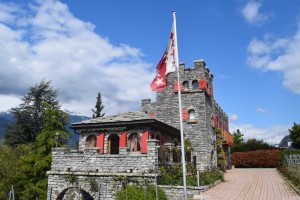Vino Las Vegas Wine Club
The Unique Wines Of Switzerland
Switzerland has something for everyone. Whether you like the glitz and glamour of Zurich or the world-class skiing available in the renowned Matterhorn region, you can enjoy yourself any time of year.
If you are an oenophile on a lifetime search for unique wines that are not widely available or an avid hiker, the Valais region has it all for you.
Our itinerary included a 17 km tour up and over steep inclines through fragrant mountain forests, creeks, and suspension bridges. Our trail dates back centuries, originally mule paths and vineyard trails. Our 17 km hike was just part of over 8000 kilometers of signposted hiking paths that anyone can explore. We took the high road through lush alpine meadows and mountains, where the reward for our hard work was a magnificent view of the valley and vineyards below.
There was no worry of getting lost; the path is well-marked and accessible all year round. The wine trail runs along quiet tracks, passing by winegrowers’ homes, through vineyards, and the impressive Gorges de la Raspille, a site of outstanding natural beauty. Even an encounter with marmots, chamois or even mountain goats is possible on the journey. Besides enjoying the incredible views, our mission (which we eagerly accepted) was a search for rare wines and exciting winemakers. Off we went on foot from German-speaking Salgesch to French-speaking Sierre in pursuit of our inquiry.
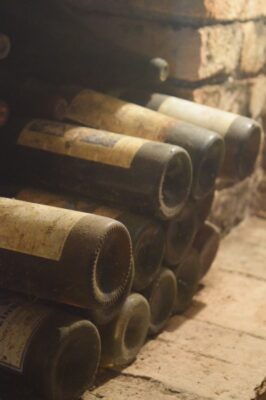
This journey had us stopping along the way to taste and enjoy different varietals cultivated in Switzerland’s most crucial winemaking region. The area is known for the elegance of its Grand Cru and is home to the highest vineyards in Europe.
Our first stop was the German-speaking Caveau de Salquenen, founded in 1913 by Alfred Kuonen and the first winery in the village of Salgesch. You could feel the history as we walked back in time through this ancient village to the winery. There is also a Musee du Vin, the museum of wine, located within the town for those interested in further wine education and history. Today, however, we were greeted by the young and beautiful local winemaker Larissa Kuonen. She had spent years studying, earning her Bachelor’s degree; she began work with her family at the winery. In 2009 she became an oenologist at the winery.
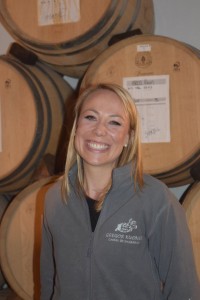
Sitting down with her was a master class on the region’s wines. As she poured the first of many wines, she explained the Grand Cru de Salquenen is a wine produced only in the municipality. The winemakers in Salquenen are extremely strict, and the requirements of the label are rigorous. Grape production is only limited to 800 grams per square meter. Sugar adding, blending, or maturing in barrels is strictly forbidden and must age in the producers’ cellars for at least 15 months before being presented to a national wine-tasting commission.
Wine is designated Grand Cru only if awarded 18 out of 20 points and then decorated with the golden label of the municipality of Salquenen. These wines were mentioned initially in the 11th Century as Salconio.
“This is the “time” factor that has the greatest impact on the quality of the grapes. I pay particular attention during the harvest to encave only excellent quality fruit. As we do not influence the weather, winemaking is a challenge for any oenologist annually. I like to compare my work with art. Creating a wine reflects my passion. The character of the oenologist is transmitted into the wine,” stated Larissa.
I enjoy making wine because it lends itself to diversity. With it, I can unleash my creativity with greater freedom. ” Larissa added.
When looking at Swiss wines, some varietals demand attention. Heida (as it is named in Upper Valais) or Païen, is the name given in Valais to white wine from the sauvignon grape, also known as Traminer. We first tasted this varietal on the slopes of Europe’s highest vineyards in Visperterminen, up to 1,100 meters above sea level. Make sure to stop at the impressive St. Jodern Kellerei winery and retail shop to purchase a bottle or two. The wine is exceptional, with an extraordinary range of citrus and exotic fruits.
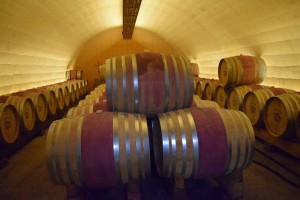
Of course, we just had to taste through and taste Petite Arvine. This premieres as “THE” Valais white wine without question and has been considered exclusive to Valais since 1602. It’s delicate, hard to grow, sensitive to the wind, and last to develop. The varietal is very picky and requires only the best exposures, preferably not too dry. But when it’s right, it is right! Think grapefruit flavors with notes of rhubarb. On the palate, it is bright with a slightly savory touch.
As the song says, over the river and through the woods (not to Grandma’s house this time), we searched for another lovely wine and found one, all right! After a lovely lunch featuring Chicken Cordon Bleu and a few bottles of the wines mentioned earlier in the village of French-speaking Miege, we bid Au Revoir to restaurant Muzot and continued our mission. A walkabout through Miege, and gastronomically satisfied, we found Cave Caloz and yet another young winemaker you will hear from for years to come. Winemaker Sandrine Caloz has wine in her veins and now her vines as she now carries on the family history of excellent winemaking.
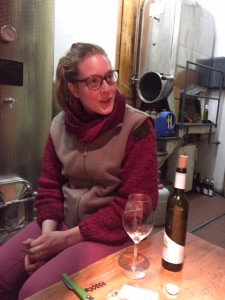
Sandrine is the oldest of four daughters and graduated from the University Of Engineering in Changins, Switzerland in 2013. She has been working at the family winery ever since and explained she tries to combine technology and tradition to produce the best wines in the area.
Again a true family affair, her grandfather Fernand, the winery founder, began Caloz winemaking from its grapes in 1960 and 1970 bottled the first vintage. For 26 vintages, the family has continued to improve the vineyards and vintages Caloz. We spent an entire afternoon and evening with Sandrine tasting through vintages dating back to 1984. “My grandfather bottled this wine which is now older than me,” she said laughingly.
Our education was not over by any means. Sandrine joined us at the prestigious 2-star Michelin Chef Didier du Courten, where we paired Swiss wine and world-class cuisine from the region. Our day fully complete, we returned to our room at the splendid Castel de Daval to contemplate our next day’s journey. Castel de Daval, a charming rendition of a miniature Castle, is the place to stay while visiting the Sierre region. The Caloz family (distant relatives of the winemaker Sandrine) will make you feel at home at this lovely bed and breakfast, with glorious mountain views, nestled within a vineyard. This family-owned B&B will charm your soul and wallet and is the best value in the region.
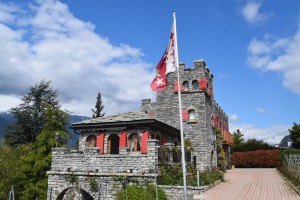
The Valais region deeply affected us, changing our lives by experiencing its charm, cuisine, and wine. This area is the perfect escape for a few days, weeks, or even months. No matter what time of year or length of your visit, there is something for you to enjoy, sip and savor.

